Filed Under #teaching
Dec 4, 2025
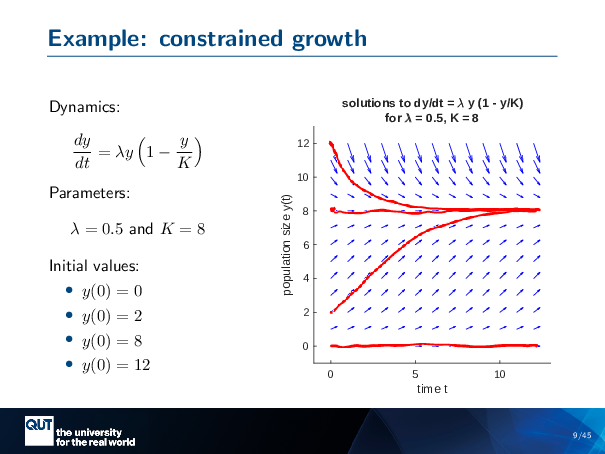 This semester, I had the opportunity to do 7 weeks of “interactive lectures” at QUT for MXB261 Modelling and Simulation Science, as well as one guest lecture on evolutionary game theory. In this blog post, I’ll talk about my experiences, share the first half of one of the lectures I gave, and provide the code, to generate the figures, in case any of that is useful to anyone. The Unit Coordinator is transforming the MXB261 into a game theory unit, and the first 7 weeks were “old” material she will replace in the coming years. Students responded really well to...
This semester, I had the opportunity to do 7 weeks of “interactive lectures” at QUT for MXB261 Modelling and Simulation Science, as well as one guest lecture on evolutionary game theory. In this blog post, I’ll talk about my experiences, share the first half of one of the lectures I gave, and provide the code, to generate the figures, in case any of that is useful to anyone. The Unit Coordinator is transforming the MXB261 into a game theory unit, and the first 7 weeks were “old” material she will replace in the coming years. Students responded really well to...
Lecture notes on stability in the dynamics and Euler's method
 This semester, I had the opportunity to do 7 weeks of “interactive lectures” at QUT for MXB261 Modelling and Simulation Science, as well as one guest lecture on evolutionary game theory. In this blog post, I’ll talk about my experiences, share the first half of one of the lectures I gave, and provide the code, to generate the figures, in case any of that is useful to anyone. The Unit Coordinator is transforming the MXB261 into a game theory unit, and the first 7 weeks were “old” material she will replace in the coming years. Students responded really well to...
This semester, I had the opportunity to do 7 weeks of “interactive lectures” at QUT for MXB261 Modelling and Simulation Science, as well as one guest lecture on evolutionary game theory. In this blog post, I’ll talk about my experiences, share the first half of one of the lectures I gave, and provide the code, to generate the figures, in case any of that is useful to anyone. The Unit Coordinator is transforming the MXB261 into a game theory unit, and the first 7 weeks were “old” material she will replace in the coming years. Students responded really well to...
Oct 31, 2023
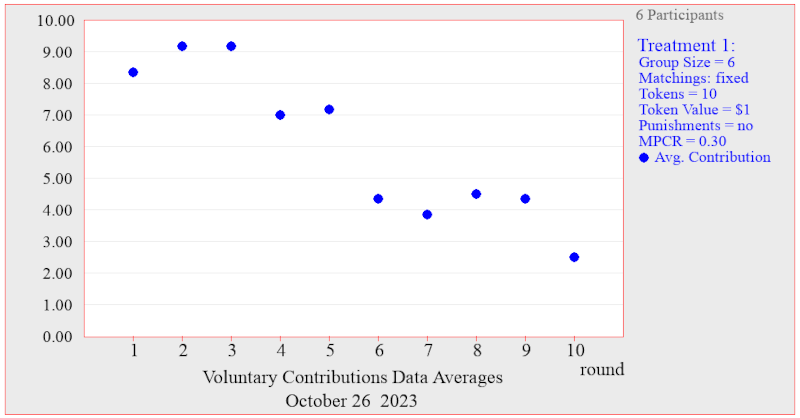 Each year since 2017, I’ve been taking one lecture for Ryan’s subject LSM4255 Methods in Mathematical Biology, teaching evolutionary game theory and adaptive dynamics. After the class, we usually have a tutorial where we play the fishing game, a simulation of a fishery that teaches students about the tragedy of the commons. Screenshot from the fishing game, which was sadly not available this year. Unfortunately, the fishing game was unexpectedly unavailable this year, but I was able to find a very nice last-minute alternative. Charles Holt at the University of Virginia has made available the Veconlab software, a collection of...
Each year since 2017, I’ve been taking one lecture for Ryan’s subject LSM4255 Methods in Mathematical Biology, teaching evolutionary game theory and adaptive dynamics. After the class, we usually have a tutorial where we play the fishing game, a simulation of a fishery that teaches students about the tragedy of the commons. Screenshot from the fishing game, which was sadly not available this year. Unfortunately, the fishing game was unexpectedly unavailable this year, but I was able to find a very nice last-minute alternative. Charles Holt at the University of Virginia has made available the Veconlab software, a collection of...
Web-based public goods game and other experiments for teaching
 Each year since 2017, I’ve been taking one lecture for Ryan’s subject LSM4255 Methods in Mathematical Biology, teaching evolutionary game theory and adaptive dynamics. After the class, we usually have a tutorial where we play the fishing game, a simulation of a fishery that teaches students about the tragedy of the commons. Screenshot from the fishing game, which was sadly not available this year. Unfortunately, the fishing game was unexpectedly unavailable this year, but I was able to find a very nice last-minute alternative. Charles Holt at the University of Virginia has made available the Veconlab software, a collection of...
Each year since 2017, I’ve been taking one lecture for Ryan’s subject LSM4255 Methods in Mathematical Biology, teaching evolutionary game theory and adaptive dynamics. After the class, we usually have a tutorial where we play the fishing game, a simulation of a fishery that teaches students about the tragedy of the commons. Screenshot from the fishing game, which was sadly not available this year. Unfortunately, the fishing game was unexpectedly unavailable this year, but I was able to find a very nice last-minute alternative. Charles Holt at the University of Virginia has made available the Veconlab software, a collection of...
Jul 14, 2023
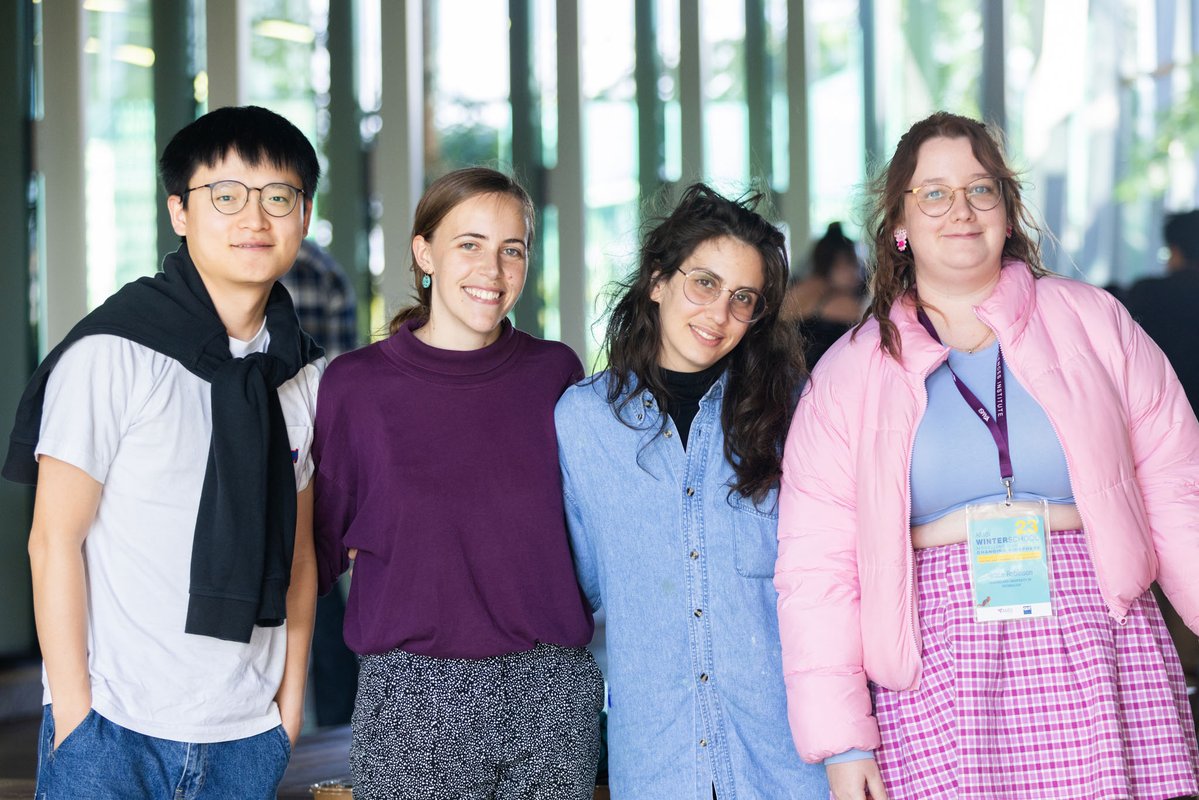 For 2 weeks, I’ve been teaching at and attending the AMSI Winter School at QUT (Mastodon thread about it here). The winter school is an annual event for postgrads, early-career researchers, and industry professionals, and about 40 students attended this year. Some students from the Winter School. I was one of four presenters on the theme Modelling Our Changing Biosphere. I taught about evolutionary game theory, and we also learnt about modelling fisheries (with Nokuthaba Sibanda from University of Wellington), reinforcement learning (with Carl Boettiger from University of California), model sloppiness (with Matthew Adams from Queensland University of Technology), and...
For 2 weeks, I’ve been teaching at and attending the AMSI Winter School at QUT (Mastodon thread about it here). The winter school is an annual event for postgrads, early-career researchers, and industry professionals, and about 40 students attended this year. Some students from the Winter School. I was one of four presenters on the theme Modelling Our Changing Biosphere. I taught about evolutionary game theory, and we also learnt about modelling fisheries (with Nokuthaba Sibanda from University of Wellington), reinforcement learning (with Carl Boettiger from University of California), model sloppiness (with Matthew Adams from Queensland University of Technology), and...
AMSI Winter School
 For 2 weeks, I’ve been teaching at and attending the AMSI Winter School at QUT (Mastodon thread about it here). The winter school is an annual event for postgrads, early-career researchers, and industry professionals, and about 40 students attended this year. Some students from the Winter School. I was one of four presenters on the theme Modelling Our Changing Biosphere. I taught about evolutionary game theory, and we also learnt about modelling fisheries (with Nokuthaba Sibanda from University of Wellington), reinforcement learning (with Carl Boettiger from University of California), model sloppiness (with Matthew Adams from Queensland University of Technology), and...
For 2 weeks, I’ve been teaching at and attending the AMSI Winter School at QUT (Mastodon thread about it here). The winter school is an annual event for postgrads, early-career researchers, and industry professionals, and about 40 students attended this year. Some students from the Winter School. I was one of four presenters on the theme Modelling Our Changing Biosphere. I taught about evolutionary game theory, and we also learnt about modelling fisheries (with Nokuthaba Sibanda from University of Wellington), reinforcement learning (with Carl Boettiger from University of California), model sloppiness (with Matthew Adams from Queensland University of Technology), and...
Nov 29, 2022
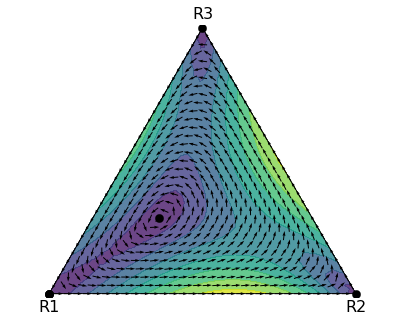 Recently, I set a task for a student to use Python to analyse the replicator dynamics of a game with three strategies, including using the Jacobian to determine the stability of the steady state. The purpose of this blog post is to share the solution in case that’s useful to someone. The game For this task, we will consider the replicator dynamics of a 2-player game with 3 strategies. Recall the general equation for the replicator dynamics is \[\begin{equation} \dot{p}_i = p_i (f_i - \bar{f}) \end{equation}\] where \(p_i\) is proportion of \(i\)-strategists in the population, \(f_i\) is fitness effect of...
Recently, I set a task for a student to use Python to analyse the replicator dynamics of a game with three strategies, including using the Jacobian to determine the stability of the steady state. The purpose of this blog post is to share the solution in case that’s useful to someone. The game For this task, we will consider the replicator dynamics of a 2-player game with 3 strategies. Recall the general equation for the replicator dynamics is \[\begin{equation} \dot{p}_i = p_i (f_i - \bar{f}) \end{equation}\] where \(p_i\) is proportion of \(i\)-strategists in the population, \(f_i\) is fitness effect of...
Example numerical analysis of replicator dynamics with more than 2 strategies
 Recently, I set a task for a student to use Python to analyse the replicator dynamics of a game with three strategies, including using the Jacobian to determine the stability of the steady state. The purpose of this blog post is to share the solution in case that’s useful to someone. The game For this task, we will consider the replicator dynamics of a 2-player game with 3 strategies. Recall the general equation for the replicator dynamics is \[\begin{equation} \dot{p}_i = p_i (f_i - \bar{f}) \end{equation}\] where \(p_i\) is proportion of \(i\)-strategists in the population, \(f_i\) is fitness effect of...
Recently, I set a task for a student to use Python to analyse the replicator dynamics of a game with three strategies, including using the Jacobian to determine the stability of the steady state. The purpose of this blog post is to share the solution in case that’s useful to someone. The game For this task, we will consider the replicator dynamics of a 2-player game with 3 strategies. Recall the general equation for the replicator dynamics is \[\begin{equation} \dot{p}_i = p_i (f_i - \bar{f}) \end{equation}\] where \(p_i\) is proportion of \(i\)-strategists in the population, \(f_i\) is fitness effect of...
Aug 1, 2022
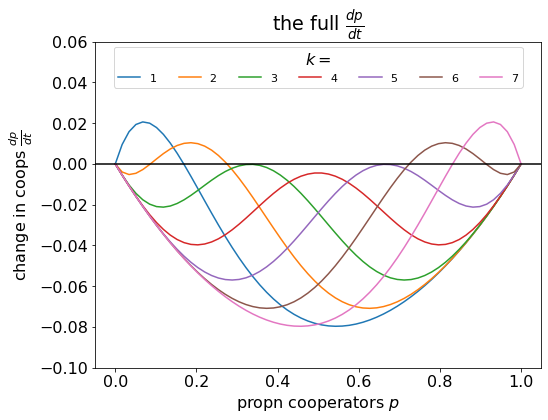 Last month, I chose a paper by Kris De Jaegher in Scientific Reports for our weekly lab-meeting discussion. We used the paper to teach ourselves about threshold games, and the purpose of this blog post is to summarise the things we learnt. Replicator dynamics revision De Jaegher used the replicator dynamics approach. Replicator dynamics assumes a well-mixed, infinitely large population of players that reproduces asexually, where the number of offspring they produce depends upon the payoff they receive from a game-theoretic ‘game’, as illustrated below:– Replicator dynamics animation, created by HowieKor (Creative Commons) We start with a population of \(n\)...
Last month, I chose a paper by Kris De Jaegher in Scientific Reports for our weekly lab-meeting discussion. We used the paper to teach ourselves about threshold games, and the purpose of this blog post is to summarise the things we learnt. Replicator dynamics revision De Jaegher used the replicator dynamics approach. Replicator dynamics assumes a well-mixed, infinitely large population of players that reproduces asexually, where the number of offspring they produce depends upon the payoff they receive from a game-theoretic ‘game’, as illustrated below:– Replicator dynamics animation, created by HowieKor (Creative Commons) We start with a population of \(n\)...
Lab meeting about threshold games
 Last month, I chose a paper by Kris De Jaegher in Scientific Reports for our weekly lab-meeting discussion. We used the paper to teach ourselves about threshold games, and the purpose of this blog post is to summarise the things we learnt. Replicator dynamics revision De Jaegher used the replicator dynamics approach. Replicator dynamics assumes a well-mixed, infinitely large population of players that reproduces asexually, where the number of offspring they produce depends upon the payoff they receive from a game-theoretic ‘game’, as illustrated below:– Replicator dynamics animation, created by HowieKor (Creative Commons) We start with a population of \(n\)...
Last month, I chose a paper by Kris De Jaegher in Scientific Reports for our weekly lab-meeting discussion. We used the paper to teach ourselves about threshold games, and the purpose of this blog post is to summarise the things we learnt. Replicator dynamics revision De Jaegher used the replicator dynamics approach. Replicator dynamics assumes a well-mixed, infinitely large population of players that reproduces asexually, where the number of offspring they produce depends upon the payoff they receive from a game-theoretic ‘game’, as illustrated below:– Replicator dynamics animation, created by HowieKor (Creative Commons) We start with a population of \(n\)...
Oct 23, 2018
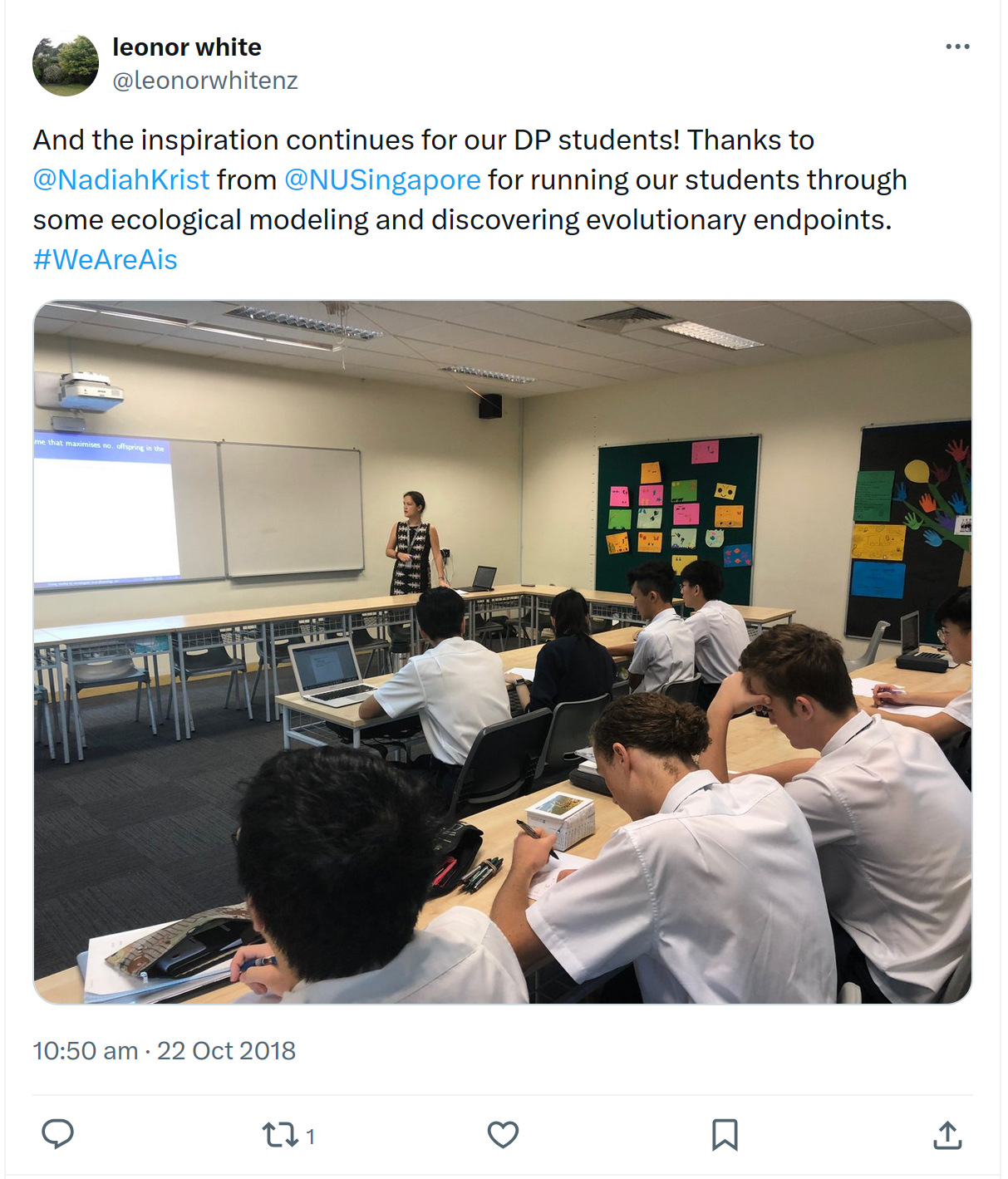 Yesterday, I had the pleasure of teaching Year 12 students at
Australian International School about
eco-evolutionary modelling.
I created a simplified version of the mathematical model from
my paper in Proceedings of the Royal Society B
so they could solve it during class.
Yesterday, I had the pleasure of teaching Year 12 students at
Australian International School about
eco-evolutionary modelling.
I created a simplified version of the mathematical model from
my paper in Proceedings of the Royal Society B
so they could solve it during class.
Guest teacher at AIS highschool
 Yesterday, I had the pleasure of teaching Year 12 students at
Australian International School about
eco-evolutionary modelling.
I created a simplified version of the mathematical model from
my paper in Proceedings of the Royal Society B
so they could solve it during class.
Yesterday, I had the pleasure of teaching Year 12 students at
Australian International School about
eco-evolutionary modelling.
I created a simplified version of the mathematical model from
my paper in Proceedings of the Royal Society B
so they could solve it during class.
Nov 7, 2017
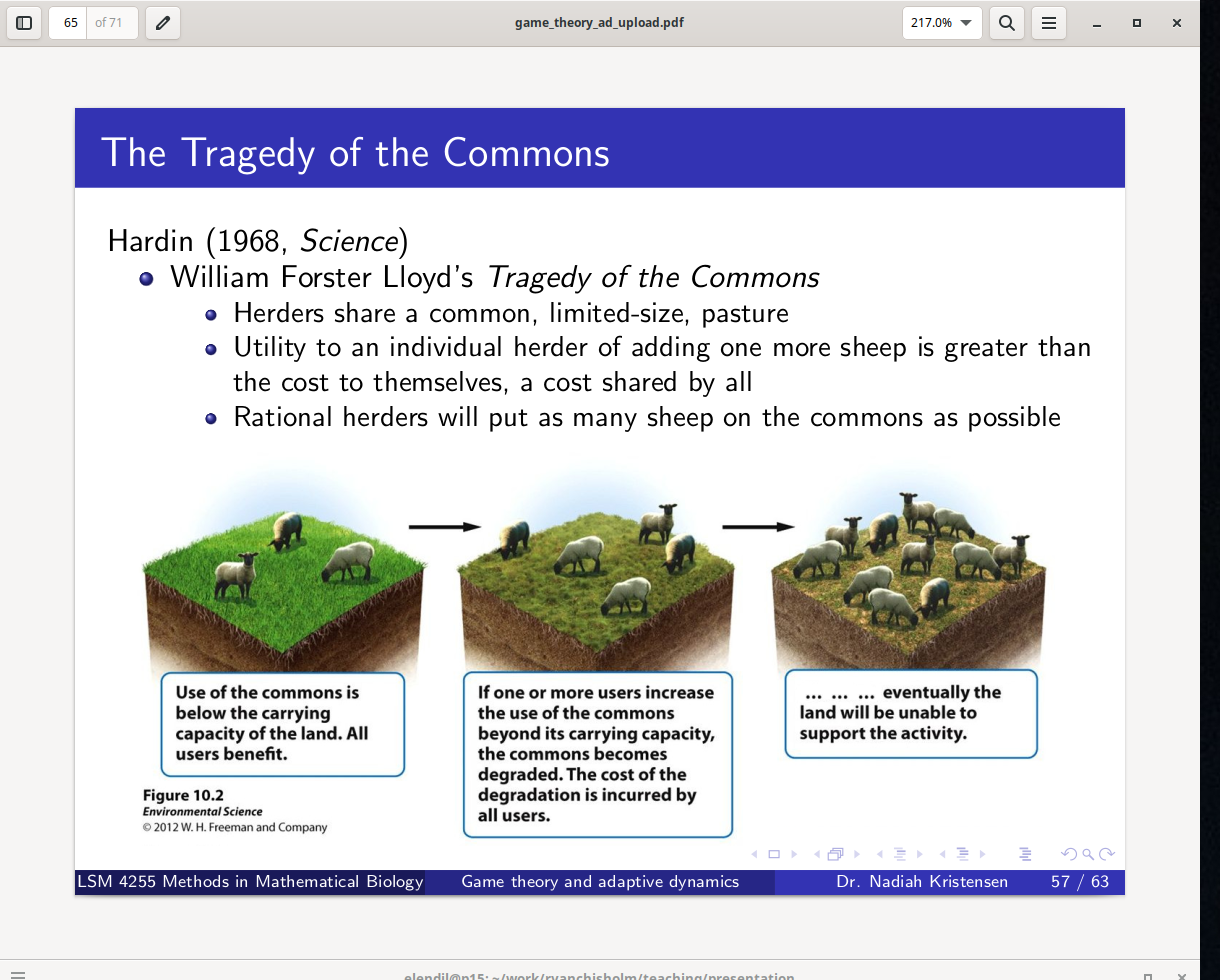 These are the lecture slides for LSM4255 Game Theory and Adaptive Dynamics.
This is the short version with the point-by-point transitions removed.
Downloads:
2025: game_theory_ad4_shorter.pdf
2023: game_theory_ad2_upload.pdf
2017: game_theory_ad_upload.pdf
Preview of lecture notes.
These are the lecture slides for LSM4255 Game Theory and Adaptive Dynamics.
This is the short version with the point-by-point transitions removed.
Downloads:
2025: game_theory_ad4_shorter.pdf
2023: game_theory_ad2_upload.pdf
2017: game_theory_ad_upload.pdf
Preview of lecture notes.
Lecture notes for LSM4255 Game Theory and Adaptive Dynamics
 These are the lecture slides for LSM4255 Game Theory and Adaptive Dynamics.
This is the short version with the point-by-point transitions removed.
Downloads:
2025: game_theory_ad4_shorter.pdf
2023: game_theory_ad2_upload.pdf
2017: game_theory_ad_upload.pdf
Preview of lecture notes.
These are the lecture slides for LSM4255 Game Theory and Adaptive Dynamics.
This is the short version with the point-by-point transitions removed.
Downloads:
2025: game_theory_ad4_shorter.pdf
2023: game_theory_ad2_upload.pdf
2017: game_theory_ad_upload.pdf
Preview of lecture notes.